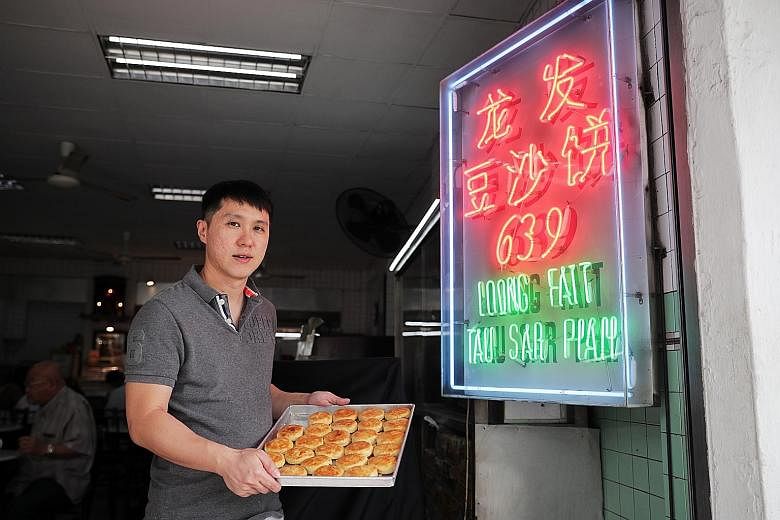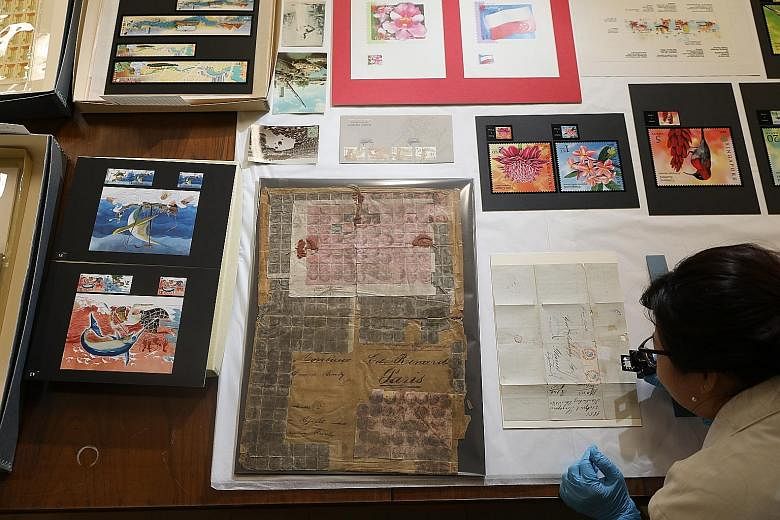The Loong Fatt Tau Sar Piah shop in Balestier has a history dating back to 1948, but its story does not begin with its popular flaky mung bean pastry.
Behind the heritage brand is a riveting story of how its Hainanese founder made many attempts to succeed in early Singapore's food industry - from selling chicken rice to kaya toast - before eventually finding his sweet spot and speciality in the form of the humble tau sar piah.
From today, this story will be on display in a National Heritage Board-funded heritage corner within the shop itself, at 639 Balestier Road.
Its third-generation owner, Mr Xavier Lee, 39, whose late grandfather Lee Wang Long founded the business, worked with the National Heritage Board (NHB) to put the heritage corner together.
Also on show will be his grandfather's traditional baking moulds, rolling pins and signed receipts and invoices.
The shop is one of five businesses in Balestier with long histories that are part of NHB's new Street Corner Heritage Galleries programme.
The scheme, announced in Parliament yesterday by Senior Parliamentary Secretary for Culture, Community and Youth Baey Yam Keng, highlights shopkeepers with at least 30 years of experience in Singapore's historical precincts.
NHB deputy chief executive of policy and community Alvin Tan said the initiative aims to revitalise heritage precincts.
He added: "We also want to equip our precinct stakeholders with the necessary competencies in heritage programming so as to grow the heritage ecosystem."
The mini-museum programme will be rolled out by 2022 to heritage shops in four other historical precincts: Kampong Glam, Little India, Geylang Serai and Kreta Ayer.
Other shops in Balestier to have their own mini museums are Loy Kee Best Chicken Rice, Lim Kay Khee Optical and Contact Lens Centre, Lam Yeo Coffee Powder Factory, and Sweetlands Confectionery and Bakery. The heritage galleries at these places also open today.
Mr Lee said he took part in the programme to give Singaporeans a flavour of the blood, sweat and tears shed by the island's forefathers to survive and succeed in early Singapore.
To further raise awareness of these heritage galleries, NHB will give each shopkeeper up to $1,000 a year to develop programmes or participate in key events it organises.
Also in the works is a revamp of the Singapore Philatelic Museum into a child-centric space by next year. It will be targeted at children aged 12 and below. The Coleman Street museum closed last March for the revamp.
Its new permanent galleries will encourage children to discover hidden treasures based on archaeological finds from Fort Canning, "travel back in time" for encounters with early pioneers, and run a neighbourhood post office.
The museum's collection of stamps, postcards and letters will be used alongside other objects to support children's learning, and be part of its refreshed permanent galleries and special exhibitions.
Mr Vincent Phang, SingPost's chief executive of postal services and Singapore chief, said SingPost is disappointed by the museum's new direction, although it understands NHB's intent to reposition it.
Mr Phang, who also sits on the museum's board of directors, said: "While we (SingPost) are disappointed that it will no longer be a museum dedicated to philately and postal services, it is good news that the existing collections will still be made available when it reopens in 2021. Singapore's postal service dates back to 1858, and we see the value in preserving this heritage."
To reach even more young Singaporeans, the NHB and Education Ministry's pilot of a museum-based learning programme for Primary 6 and Secondary 2 students will become mandatory from this year.
NHB plans to extend this programme, which is designed to reinforce lessons taught in social studies and history classes, among other aims, to Primary 4 and Primary 5 pupils.
Mr Baey also unveiled plans to start a National Online Repository of Singapore arts. The National Arts Council and National Library Board will work closely with the arts community to select, digitise and organise materials.
These include materials related to major festivals, Cultural Medallion and Young Artist Award recipients and key arts organisations.



